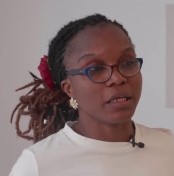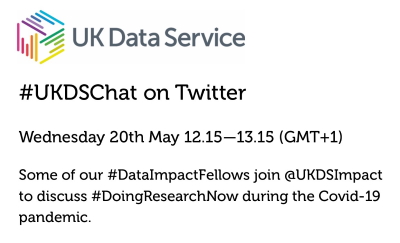Recently, some of our #DataImpactFellows joined us for a fantastic Twitter chat on the theme of #DoingResearchNow.
Who took part?
We asked our Fellows to introduce themselves:
I am an Insight Analyst for the Insight, Strategy and Innovation team at NHS Blood and Transplant. My team works to be the voice of the donor/patients and improve their experience through data analysis and research.
I’m completing a PhD at @SouthCoastDTP @PhD_Brighton which looks at the labour market responses of firms to immigration since the financial crisis, but at the moment I’m on an internship at the research dept of the International Organization for Migration (IOM) @UNmigration, the UN’s migration agency.
I am a Research Economist at IES (@EmploymtStudies) where I undertake quantitative labour market analysis. I am currently producing weekly updates on vacancy levels using @adzuna data using UKDS data to contextualise findings.
I work at @YorkEnvironment , as a Participatory GIS researcher on an EU-funded research project @PericlesProject. I am also writing up my @ESRC funded PhD thesis exploring the relationship between the natural environment and subjective well-being.
I am an Earth Observation and GIS Scientist on the GEOM programme at Aberystwyth University.
I’m a @BritishAcademy Postdoctoral Fellow @UniofOxford studying inequalities in material and psychological wellbeing. Working from home since March 9th.
I’m based at LSE and I study the economics of crime and education, with a focus on the role of education policy on crime prevention. I’ve been working from home since early March too.
I have recently received my PhD conferment from @bournemouthuni where in my research I developed an extended CRISP-DM model for UK SMEs’ in the private coach hire industry. I am now a Data Product Manager (Commercial) with @Dyson.
I am a researcher @UCLSocSci @CLScohorts. I work on a number of projects broadly tackling social inequalities. The details vary from the Gender Wage Gap project to the technical aspects of harmonising earnings and income data.
What’s changed in the way you are #DoingResearchNow? What’s made it more challenging?
James noted that the impact on the labour market is huge so the demand for fast quantitative analysis on the impact of #Covid19 has picked up significantly. It was good to hear that one of his charts had featured on Sky News and he could see how he and his team are making an influence on policymakers on a daily basis.
Several of the Fellows noted that due to the desk-based nature of their research, their day-to-day work had not significantly changed.
Ben noted that not much has changed with his IOM internship work. Meanwhile Sarah commented that her job can be done online and that, as the project team is based across seven countries, they have always worked online.
Marii and Matteo both commented on how losing everyday encounters with colleagues around campus was, at the very least, a social loss and – for Matteo – causing him more difficulties with his research. As he said,
Being part of a community is a key ingredient of research. Whether by attending seminars, discussing research or sharing ideas over lunch, I learn something everyday from @CEP_LSE colleagues. Inevitably, the lockdown has reduced these fruitful chats.
Similarly, Aishah commented:
In the current lock-down environment, staying motivated and focus has been more challenging. Unlike the norm, where we can walk up to someone for a cup of coffee and have a quick catch up. This is something you can’t do virtually.
Ben noted that he’s quite glad that he’s not working on his PhD at the moment, because of his work with the IoM, as access to UK Data Service secure data currently requires different agreements and rules.
Anthonia noted that she is restricted with the type of work she can do between travel restrictions halting fieldwork and the challenges of social distancing with teams and SMEs she works with. She added that she is using the time to do more writing and hopes to run online workshops.
A huge hindrance to research was discussed by Sarah and Anthonia – the difficulty of balancing work with childcare and homeschooling.
Sarah commented that she can only work half the time she used to because she has a toddler in the house. While Anthonia added,
I am having to be flexible with my time now, sometimes working weekends, nighttime. I have more caring responsibility with two kids, home schooling them, taking care etc. I feel the 1950s traditional role of women revisit my home.
As Sarah pointed out, it’s no coincidence that women’s research outputs have dropped dramatically during the Covid-19 crisis.
Have there been any positives for you #DoingResearchNow?
This question produced a range of responses from our Fellows.
There were those who were excited to see the impact of their work more quickly than they might in ‘normal’ times.
Anne said,
When I am working critical work means that I get to see the impact quicker which is quite rewarding.
While James commented on how the current situation has helped him realise how highly the work he does is regarded, given its coverage in The Independent, the Irish Times, the Daily Mirror and The Sun. Inspiringly, he added,
I don’t think I will ever leave research!
Aishah has discovered that moving into industry has made use of the skills she has developed doing academic research:
My experience as a PhD researcher has helped me to excel in my current role where there is a demand for analytical thinking and collaborative working.
Some Fellows have become involved in discovering new insights into people’s lives during the Covid-19 situation. Ben said,
Given the impact of Coronavirus on migration/mobility, we’ve started producing “COVID-19 analytical snapshots” which look at some of the key issues that have arisen due to the pandemic. They’ve been super interesting to write!
While Bozena told us that
Despite it all I also find it interesting to work on the aspects of Covid-19! The Centre for Longitudinal Studies also launched a nationwide survey of the participants of five national longitudinal cohort studies, to examine the impact of the COVID-19 pandemic.
Another thing that Fellows commented on was that they were creating personal and work-related benefits during this time.
We really liked Sarah’s idea:
I’ve started keeping a log of everything I do each day. It helps me to realise that I have been more productive than I think I have been. Even on days when I haven’t been very productive!
Anne, who has been very open in a recent blog post about the challenges of the coronavirus situation for her personally, found both a positive and a negative from her current working patterns:
Surprisingly enjoying the fast pace working style, it’s when I have to slow down that I find I struggle to motivate myself. I suppose that means external pressures are driving me!
Bozena reflected on a perhaps unexpected bonus of lockdown.
I found myself having more time to think and reflect, but also to learn knitting, embroidery, do gardening, and even to do a few jigsaw puzzles.
Bozena’s contribution led back to work in an interesting discussion between her and Sarah.
Great that you are gardening! Part of my PhD research looks at the importance of having a garden/terrace…this seems to have become hugely important during the lockdown.
Indeed! It also exhilarates the inequalities between the “haves” and “have-nots”. I sometimes think people do not realise that the group of 10 people sitting in the park may be one household!
In the British Household Panel Survey dataset I work with, I find approx. 12% of Londoners don’t have access to a garden/terrace. That garden/terrace may be tiny, shared, grey (no plants) etc. Leaving your home is the only option for getting outside.
Has the current crisis changed your perceptions about the value of your research?
Our Data Impact Fellows have discovered how relevant their research is to today’s society. Ben noted that his research was directly related to policy changes being discussed in Parliament that week.
I think it’s made my research even more important. Just this Monday the government was moving to pass the post-Brexit immigration system into law, but Coronavirus has highlighted just how important certain workers (e.g. care home staff) are to the UK.
Marii similarly noted:
Yes, socioeconomic problems are even more apparent during a crisis like this and more research on the consequences of economic hardship and economic stress is needed
While Anthonia had become very aware of how the tools and approaches used in social science research have become much more widely used and understood during the crisis.
I see how much data, mapping, visualisation and GIS has taken a centre stage on communicating the pandemic. I see this triggering a tsunami in this area particularly investments in data infrastructure, data science etc
Meanwhile Sarah was very positive that her field of work is now becoming more recognised as relevant to people’s wellbeing.
Green and blue spaces are important! The natural environment generally, inside (plants, photos) and outside (public spaces, domestic gardens) your home have become even more important during lockdown.
Ben has a very positive changed perception:
Data scientists used to be the uncool ones at parties, but now thanks to the pandemic everyone will be flocking to them. (Maybe they weren’t the uncool ones – if that’s the case they’ll presumably have the data to prove it!).
Not that the UK Data Service impact team for one moment thought data scientists were ever anything but super cool.
Top tips
Our Data Impact Fellows were enthusiastic in coming forward with ideas for surviving (and hopefully thriving) in the ‘new normal’. This is our compilation:
- It is important to be realistic in what you can achieve! Accept that productivity may be lower than normal We set such high standards for ourselves, so it’s natural that we won’t always hit them.
- Wear different clothes to work so you’re not permanently in trackies!*
- Try to set a good routine for the day.
- If possible, try and work in a different space to where you relax. Finding the distinction between “home” and “work”, when working from home is very important!
- It’s really important to make sure you have a proper workstation to avoid shoulder and neck pain and RSI issues. Bozena suggested sitting on a fit ball instead of a chair (she also pointed out that it’s comfy, multi-functional, and if you don’t like it you can just deflate it).
- Take regular breaks from your desk. Move your body even if it is from one end of your sitting room to the other. Attend virtual coffee times. Exercise.
- Prioritise your health over work.
- Since this is difficult time for Early Career Researchers on fixed-term contracts, talk to your peers, your mentors or managers, but also seek consultation from the Career Services at your university.
- Do not lose the fun in the little things you do.
- Get outdoors and notice nature.
- Try to get enough sleep.
- Call friends and family regularly.
- Take up a new hobby to keep you occupied.
- Wear sunscreen if you’re working or relaxing outside.
- Try to stay positive, despite the difficult circumstances, and press on – there is a rainbow in every storm.
- Try not to worry, this too shall pass.
*The comment about trackies caused a small debate about the positive aspects of wearing trackies or onesies – our Fellows are only human, after all!
It was great to share experiences with our #DataImpactFellows. The original Twitter chat is available on the hashtag #DoingResearchNow.










